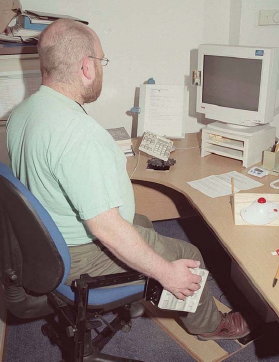![[computing]](../comp_index.gif) Contact me
Contact me
![[John's home]](../../home.gif) Last modified: Sat Jun 02 21:04:53 GMT Daylight Time 2007
Last modified: Sat Jun 02 21:04:53 GMT Daylight Time 2007

I have RSI, and have an unusual keyboard and software setup to make this less of a problem.
The keyboard is a Comfort Keyboard and is attached to my chair using some special chair arms made up for me (by a local garage!). This keyboard is a definite improvement over the other types I have tried, and mounting as shown here is a definite improvement over having it on the desk.
I also have two triple pedals made by XKeys (also sold by Kinesis and others), one of which is set up as Control, Alt and Shift, and the other of which does three keypad keys, which I have programmed with a suitable set of actions in Emacs, providing cursor movement, menu access and a few other commands -- this is enough to let me do a lot of my work almost hands-free.
I got the pedals mounted on a wooden board that has a raised section at the back with notches to locate my heels in, so I don't have to hunt around to find the pedals.
Instead of a mouse, I use a Logitech Trackman Marble, which is much better than a mouse; but still, it's best to minimize use of pointing devices altogether.
![[Home version]](home_bench.jpg)
I also have a home version of this setup, improvised from the remains of the one that I had at the workplace that fired me because of the RSI.
I'd used computers for a long time without getting RSI. The pains started to appear some time after the modern "PC layout" keyboards appeared, with the Control key in the bottom left corner (in the same row as Space) -- when it was where Caps Lock is now (next to A) I never had such problems. (I'm not the only person to have made this observation.) It was my little fingers that had problems first, I think originally appearing on my left hand first, which supports the idea that there may be a connection with this. It was also around the same time that mice came into common use, and that's what a lot of people now have their first RSI pain with.
It also occurred a while after I got a car and gradually shifted from cycling to work to driving to work. It appears that fitness is one of the factors involved.

I went to see a specialist doctor about my RSI, and he said the key to conquering it is to get fit. This does seem to be the case -- I have started to do a lot more exercise, and it's beginning to help quite quickly. As well as cycling to work and doing workouts, I have set up my typing break software to remind me to go up and down a long staircase several times a day, and that seems to be helping, too.
Don't ignore the pain -- it is a useful warning sign. Stop when it hurts! Don't even finish the sentence. Or even better, work out how long it takes before it hurts, and stop before then.
RSI tends to be worse when you are stressed. It could be a symptom of a lousy job, or a rotten project, or incompetent management. It may be helpful to change these if possible.
Don't use chair arms that press against your arms -- they can cause a lot of pain. (This is probably through reducing blood flow, and pressing tendon sheaths against tendons.)
The exact position of the keyboard can make a lot of difference.
Padding the pedals with firm foam (camping mat offcuts) makes them a lot more comfortable -- the non-slip pattern on the pedals is irritating.
I have written a separate page about this
It is possible to lose your job because of RSI, although in the UK, the legislation clearly intends that this should not need to happen -- however, it happened to me. I have started to collect information about RSI and the law.
| Typing Injury FAQ | http://www.tifaq.org/ |
| RSI-UK FAQ | RSI-UK FAQ |
| Comfort Keyboards | http://www.comfortkeyboard.com/ |
| Kinesis | http://www.kinesis-ergo.com/ |
| Logitech | http://www.logitech.com/ |
I have written some code for handsfree operation of emacs through suitable footswitches.
![[computing]](../comp_index.gif) Contact me
Contact me
|
![[John's home]](../../home.gif) Last modified: Sat Jun 02 21:04:53 GMT Daylight Time 2007
Last modified: Sat Jun 02 21:04:53 GMT Daylight Time 2007
|